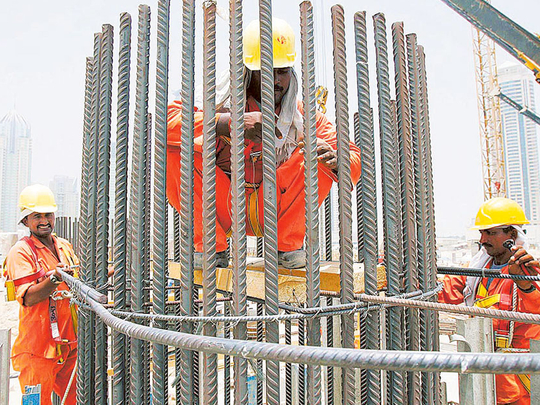
Dubai: For Suresh Jadhav, a 30-year old bar attendant in a five-star hotel in Dubai, after meeting his personal expenses, being able to save is a distant idea. But National Bonds may just offer what he is in desperate need of.
For labourers in the UAE, National Bonds, owned by the Investment Corporation of Dubai, the investment arm of Dubai government, is planning to start a saving scheme based on their requirements, a huge reprieve for the low income earners to save part of their income amid rising inflation.
“It’s a great idea. At least I can save some money and send back home,” said Jadhav over telephone from his sharing apartment.
National bonds may offer a product where a part of their salary will go into a savings product, which the investor will be able to remit the proceeds back home.
“They [low income earners] use two channels — debit card and mobile phone. We are planning to allow them to do savings through the card by putting a mandate of 10 per cent or 20 per cent of their income automatically. We will tie up with a remittance provider so that they send money back home through this platform in a cost efficient manner,” Mohammad Bitar, chief commercial officer, of National Bonds told Gulf News.
“They can save for a certain period and then remit, so we are giving them a complete solution,” he said.
“We are in talks with major companies on the Wages Protection System (WPS). We need to tie up with those people to take our value to labourers,” Bitar said.
WPS was a system that was introduced by ministry of labour so ensure that all labourers get their salaries in a timely manner
The funds under management currently stand at Dh5.2 billion as at the end of November. Last year it gave an average rate of return was 2.85 per cent. Around 70 per cent of the money is invested in low risk and highly liquid money market or fixed income and the rest goes into equity and real estate.
The fund currently has three products and services about 800,000 investors, that’s about 10 per cent of the population. The National Bonds is talking to companies to get them on board.
“The first challenge is first to convince the decision makers or companies to partner with us in spreading the message. The number of employers has doubled since last year,” said Bitar.
There are more than 50 companies including the government of Dubai, du, Dubai Airports, government of Ajman associated with National Bonds.
Need
In a poll conducted by National Bonds, about 36 per cent of the respondents save regularly, creating a need to channel their savings instead of earning very low returns on a savings banks account.
This has been a 5 per cent improvement over last year. About 55 per cent of the savers admit to saving less than 10 per cent of their income, 14 per cent say they save 30 per cent of their income.
Meanwhile, 39 per cent of the respondents said they saved as much as planned, 10 per cent claim to have saved much less than planned and another 8% admitted to saving more than planned, registering an increase of 4 per cent over 2013.
“The 2014 savings index results are clearly indicative of negative market factors inhibiting segments of the UAE population from developing a healthy savings habit and achieving financial stability. We hope engagement will positively impact all segments of society in the UAE and help communities achieve financial stability for themselves and their families,” Mohammad Qasim Al Ali, CEO of National Bonds, said.
The survey reveals that 85 per cent of the respondents who use remittance services only use exchange houses. About 54 per cent remit money outside the UAE once a month, about 34 per cent do so once every two months.
Inflation
The majority of the residents in the UAE, which stands at 87 per cent, expect their financial status will remain stable in the next six months. About 54 per cent of the respondents listed inflation and high cost as key factors impacting their savings.
About a quarter of a respondents claim as 2014 as a good time to save. Westerners and Emiratis in the UAE displayed positive sentiment across nationalities for savings.
About 62 per cent of those saving in the UAE plan to increase savings on the next six months, while 35 per cent of the savers will start saving in the next six months.
“The value that we give is different and the service that we give is much more different. I see the shopping habits of people as our biggest competition and not the banks,” said Al Ali.





